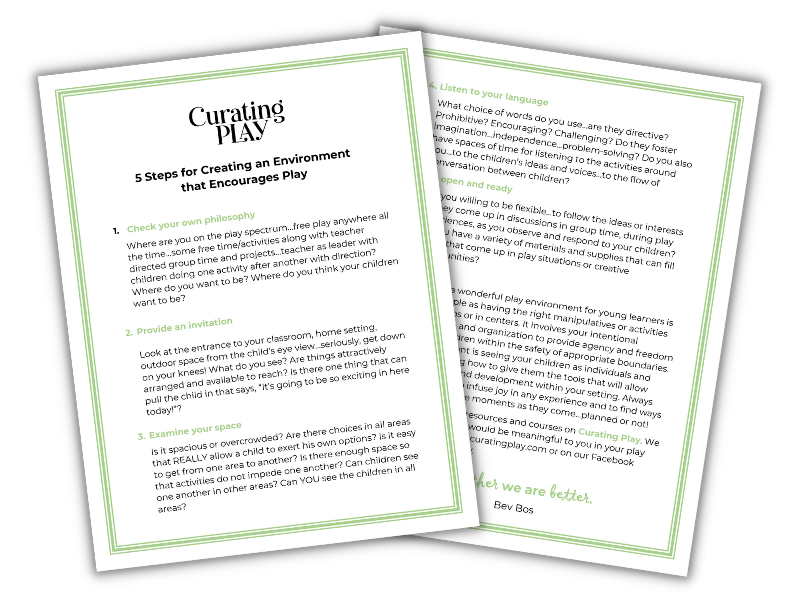Imagine a preschool classroom where four-year-olds sit at desks, tracing letters, struggling to read sight words, and completing worksheets. Now picture a different scene: children exploring blocks, painting with abandon, and discovering the joy of sharing stories in a cozy reading nook. These contrasting images represent two vastly different approaches to early childhood education. The first one, rooted in “push-down academics,” prioritizes early mastery of academic skills, while the second embraces developmentally appropriate play-based, child-led opportunities.
As advocates for play, we know the dangers of pushing academics too early. Yet, our voices are often drowned out by well-meaning but misguided policies and pressures. Today, we’ll explore why push-down academics are harmful, highlight research that supports play-based approaches, and share strategies for advocating for developmentally appropriate practices.

The Harmful Effects of Push-Down Academics
Pushing academic skills before children are developmentally ready often leads to frustration, anxiety, and even long-term aversion to learning. Research by Dr. Nancy Carlsson-Paige, a leading expert in early childhood development, reveals that early academic pressure can hinder creativity and critical thinking, skills that are essential for lifelong success. In her 2015 article “Defending the Early Years,” she emphasizes that children who are pushed into academics often show initial gains but fail to sustain them, as their deeper cognitive and social-emotional skills remain underdeveloped. We know how important those social-emotional skills are, not just in the early years but all through life’s experiences.
Another longitudinal study conducted by Vanderbilt University’s Peabody Research Institute found that children in academic-focused pre-K programs exhibited worse behavior and lower academic performance by third grade compared to peers in play-oriented programs. This evidence shows us the importance of building a strong foundation through play rather than rushing into academics.
Why Play-Oriented Opportunities Work
Play is not just fun; it is essential for learning. And while it may seem enjoyable for the most part, it can also be quite serious. Have you ever seen children having a funeral or crying for “mommie” as the baby in the family? Through play, children re-live experiences that are in their control in their environment. Yes, children develop language, social skills, problem-solving abilities, and self-regulation. These all support more challenging experiences while building resilience that readies them for more intense learning later on. It is through these foundational experiences that they become ready for the academic demands of later grades. This foundation provided through opportunities for agency, autonomy and activity is a critical and frequently missing piece in the early experiences of children.
Dr. Stuart Brown, a pioneer in the study of play, has demonstrated that playful experiences shape brain development, improving neural connections that support memory, adaptability, and executive functioning. Similarly, a study published in Pediatrics in 2018 showed that children engaged in free play exhibited higher levels of creativity and collaboration than those in structured academic settings. As we consider the workplace the children of today will enter, we know that creativity and collaboration are going to be important success factors for them.
Play is also culturally responsive and inclusive. It allows children to bring their own experiences into the learning environment from the place where they have felt secure and established a base of trust. The play environment is intentionally created to foster a sense of belonging and support engagement with not only materials and opportunities, but with other people, big and small. When children are allowed to play, they thrive—academically, socially, and emotionally—in ways they are ready for and in ways that stretch their thinking and their abilities.
Advocacy Strategies for Play-Based Learning
While the evidence is clear, advocating for play in a world focused on test scores and academic benchmarks can be challenging. Often, all parents know is what they hear from achievement-oriented assessments of older siblings or commercial advertisements that tout the importance of the newest “play-based” tool, technology or toy. Our job is to educate, inform and enlighten families about the importance of play as much as it is to provide play settings for their children.
Here are some actionable strategies to help you make the case for play:
- Share the Research
Equip yourself and others with research-based evidence. Create a simple fact sheet summarizing studies like those by Carlsson-Paige and Vanderbilt University. Share these resources with parents, colleagues, and policymakers. Highlight long-term outcomes, such as improved problem-solving skills, better mental health, and sustained academic success. - Invite Stakeholders to Observe
There’s nothing like seeing play in action. Organize open house events or classroom observations where parents, administrators, and community members can witness the richness of play-based learning. Guide them to see how children build literacy skills through storytelling or practice math concepts by measuring blocks. - Align Play with Standards
While advocating for play, it’s helpful to show how it aligns with educational standards. For example, dramatic play can support language arts standards by encouraging storytelling and vocabulary development, while building with blocks supports early math and engineering concepts. Create crosswalks that demonstrate these connections. - Empower Parents
Parents are powerful allies. Host workshops or create materials to educate them about the benefits of play. Share simple activities they can do at home, like cooking together to learn measurements or playing “I Spy” to build observational skills. - Advocate for Policy Change
Join or support organizations that advocate for play-based learning, such as Defending the Early Years or the Alliance for Childhood. Write letters to policymakers and attend school board meetings to voice concerns about push-down academics and advocate for more developmentally appropriate practices. And, of course, stay in touch with Curating Play on Facebook and Instagram!
The Path Forward
Reversing the tide of push-down academics requires everyone’s effort and firm commitment to children’s well-being and positive growth. When we champion play, we safeguard their childhood but also lay the groundwork for a future of engaged, thoughtful learners. We make a difference for the future of our society—which is a pretty big deal!
So, let’s continue to advocate for play—not just as an educational strategy, but as a fundamental right of childhood. Working together, we can build a movement that includes all the stakeholders in a child’s life and honors children for who they are now, rather than what we expect them to become. Join us at Curating Play as we Advocate, Celebrate and Talk about play…ACT for play TODAY!





